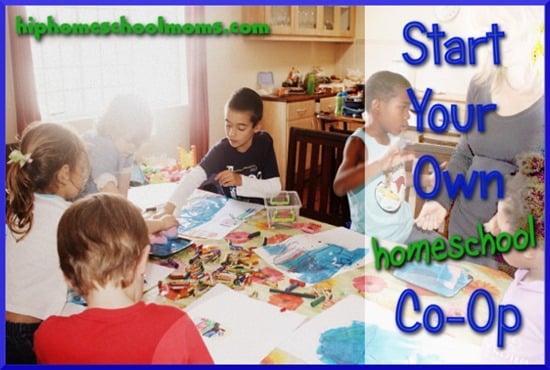Start Your Own Co-Op
Recently, I shared the 10 reasons I love my co-op. Every week we meet to share skills, social time, and endless cups of tea. Thanks to our co-op, our kids have experienced life-giving friendships and incredible learning opportunities. And the moms? We share each other’s burdens. Co-op is a balm on our weary days and a spark to inspire the rest of our week. In short, a co-op can be a great blessing. But what do you do if you don’t have a co-op in your area? The options are many, but the one that may well be necessary is: start your own co-op!

A co-op does not need to be a huge, well-oiled machine with fees, classes, and rented buildings. There are plenty of co-ops like these, and they’re awesome. What they offer is a place to do activities or classes you’d otherwise not be exposed to; opportunities to meet other families; and a chance to be involved in events that many of us miss about traditional schools (think prom or dramatic productions). But, if you’re after the warmth of like-minded people meeting together regularly to share skills and stories, then a smaller co-op made up of families meeting together in homes is an easy and manageable way to establish friendship and community. So, how do you go about doing this thing called “start your own co-op”? The options are many, but here are just a few ideas to get you started:
1. People
Finding families to take part is obviously the most important part. This can be done by reaching out to families nearby and suggesting the options to them. Don’t know many people in your area? Be brave and put out feelers on a social media support group. A simple, “Hey, I’m toying with the idea of starting a co-op in the O’Fallen, MO area – anyone here interested?” on our Hip Homeschool Moms Community Facebook group will do the trick. Some families have been known to pin an invite to the local library’s community news board. These are the more immediate ways to start a group. If you’re not so brave, or if you’re worried about bad family vibes, then perhaps start something that you can pull out of easily without hurting feelings. Park days are loads of fun, and they help families get to know each other in a neutral and non-threatening environment. From there, you may find yourselves naturally meeting up with other families more regularly.
2. Place
Our co-op moves from home to home over the year. We spend about 3 weeks at a time in one home. That way we can split the costs of hosting, and the kids get to enjoy sharing their home space with other kids. But sometimes one family may have a space that is much more conducive to meeting together than the other families in the group. Live in a city apartment that makes hosting more than half a dozen kids a little tricky? Then perhaps starting an outing-focused co-op or park day co-op is the plan for you.
3. Protocol
Co-ops are not uniform groups that are easily repeated in another environment. Each co-op molds itself around the people and philosophies that exist within the group and the spaces it occupies. But it’s almost always a good idea to establish some kind of protocol for the group. It’s all too easy for personalities to cause a co-op to disintegrate in a matter of months. So start that first meeting with an agreement of terms or a code of conduct. A good friend of mine runs our outing group. At the beginning of each year, she gets the kids to create their own code of conduct. Each child contributes his/her suggestions for how students in the group should relate to one another, the public, and the environments they encounter. They love signing their names to the conduct sheet. By the end of the day, my friend has also had a winsome chat with the moms to be sure that we are all on board too. Deciding together to be honest, kind, loving, generous, respectful, and so on is a great way to start and a helpful thing to refer to if anything does get a little uncomfortable.
4. Planning
Ultimately, a co-op runs most smoothly when everyone knows what to expect, so start things off with a good brain-storming session before you start the co-op more formally. Here are some questions to get the ball rolling:
- What do we hope to get out of co-op?
- What can we put into co-op? What skills can I bring to the group?
- How much planned activity vs how much free time?
- When to meet?
- How often?
- How big should the group be?
- Should we eat together? If so, what? Who provides the food?
- Do we mix little kids with bigger kids or separate them into groups of similar ages?
- What about cleaning up after co-op? Family roster?
- How will the group communicate? Whatsapp? Email? Facebook group?

Once you’ve got these things established, you’ll soon find that you’re part of a real live co-op! Sometimes it takes a fair bit of tweaking and adjusting to get things working well for your particular set of families, but open, honest, and kind communication and large doses of compassion and understanding can easily solve the little niggles that may come up. So what are you waiting for? Go start your own co-op!







